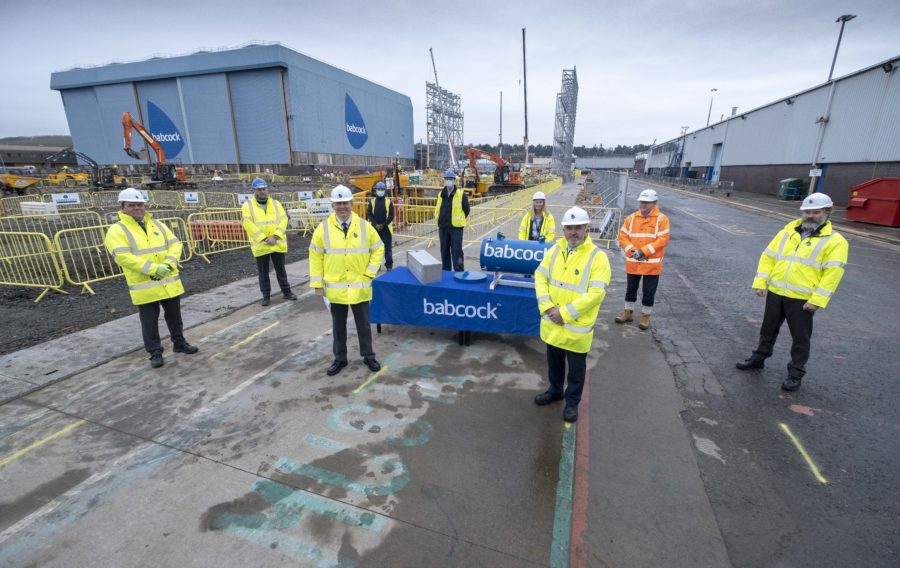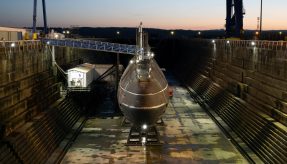
Babcock has awarded a £31.5 million contract to Robertson Construction for the development of a new Assembly Hall at its Rosyth site.
The construction project will support circa 100 positions locally in Scotland and a further 100 positions nationally throughout the supply chain.
At a small Covid-19 safe ceremony marking the beginning of the steel structure construction, Babcock also announced that it has placed an order for PEMA welding and production panel lines to support the automation of shipbuilding. This is part of a £55 million investment programme currently underway on the site, on top of a further £100 million that has been invested over the last decade, ensuring Rosyth’s shipbuilding capability and capacity can be optimised to support further opportunities, with state of the art engineering infrastructure and digital innovation at its heart.
The Assembly Hall will initially be used for the Type 31 general purpose frigate programme and provides a modern, future-ready facility designed to assemble two vessels side by side. Free from weather disruption, the facility will enable productivity gains due to improved access and digital connectivity.
Advancements inside the Assembly Hall include the use of handheld devices that will underpin the efficient flow of materials with lean thinking applied to all aspects of the build and operations. Gantry stair access inside the structure also removes the need for traditional scaffolding, enabling safe access to the vessels without leaving the building.
Additionally, three new panel lines, a cornerstone of Babcock’s digital transformation at Rosyth, will create significant efficiencies in the manufacturing process. Work has already started on the refurbishment and extension of the existing manufacturing bay which will house the panel lines.
Each PEMA production line is based on modern shipbuilding technology that enables Babcock to raise its level of automation. PEMA Thin plate panel line is equipped with the latest technologies, such as plate edge milling and robotic welding which enable high-quality production of various panel types. PEMA T-beam fabrication line is designed to make straight T-beams without any additional straightening processes.
Babcock marked the new Assembly Hall construction milestone by burying a commemorative time capsule at the site of the new facility.
John Howie, Chief Corporate Affairs Officer, Babcock said: “The Type 31 programme is re-energising the UKs’ maritime capability through innovative, next generation, UK ship design and build. The infrastructure investment underway at Rosyth builds on our exceptional heritage, experience and engineering insight, delivering a very real step change in capacity and capability for modern UK shipbuilding.
“It’s great to see the progress being made across the programme as we invest in new infrastructure and technologies to support the build phase of these fantastic new frigates. I know the team are looking forward to working closely with Robertson Construction on the development of the new Assembly Hall and with PEMA on the installation of the panel lines.”
David Cairns, regional managing director, Robertson Construction, commented: “The provision of this facility will further enhance the delivery capabilities of Babcock from the Rosyth site. We are pleased to be selected as the delivery partner of choice for the new Assembly Hall.”
Progress of the Type 31 facilities at Rosyth site follows a successful whole-ship Preliminary Design Review held in June 2020, which provided a key indicator of the compliance and design maturity. The programme is currently progressing through the Detailed Design phase.
Team 31 is already operating across the UK in Rosyth, Bristol, Devonport and Crawley, with recruitment underway to support the growth of the programme and mobilisation in readiness for ship build at Rosyth starting next year. At its height approximately 1250 people will work on the programme across the UK.
image courtesy of Babcock
If you would like to join our community and read more articles like this then please click here







